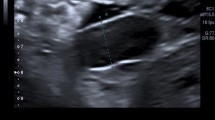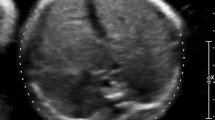Abstract
Purpose
The aim of the study was to identify which prenatal ultrasonographic findings in fetuses with gastroschisis correlate with complicated postnatal outcome.
Methods
Ultrasound findings at the 30th week of pregnancy and medical reports were statistically analyzed to identify independent prenatal ultrasonographic predictors of postnatal outcome.
Results
Completed prenatal data were gathered from 64 pregnancies. Prenatal intra-abdominal bowel dilatation (cutoff 10 mm) correlated with the presence of atresia (p < 0.01), longer administration of parenteral nutrition, extended hospital stay (median 53 vs. 21 days; 68 vs. 36 days, both p < 0.05), and greater number of additional surgical procedures (p < 0.05). Infants with antenatal presence of thickened bowel wall (greater than or equal to 3 mm) required longer administration of parenteral nutrition (median 34 vs. 20 days; p < 0.01) and prolonged stay (median 44 vs. 37 days; p < 0.05). Presence of oligohydramnion (amniotic fluid index below 8 cm) was connected with longer administration of parenteral nutrition in newborns (median 30 vs. 16 days; p < 0.05).
Conclusion
The isolated presence of oligohydramnion with amniotic fluid index below 8 cm, thickened bowel wall equal to or more than 3 mm and the prenatal intra-abdominal dilatation with 10 mm cutoff had significant predictive value for the adverse postnatal outcome of patients with gastroschisis.


Similar content being viewed by others
References
Wood SJ, Samangaya RA, Gillham JC, Morabito A (2014) Gastroschisis and the risk of short bowel syndrome: outcomes and counselling. Neonatology 105:5–8
Phillips JD, Raval MV, Redden C, Weiner TM (2008) Gastroschisis, atresia, dysmotility: surgical treatment strategies for a distinct clinical entity. J Pediatr Surg 43:2208–2212
Murphy FL, Mazlan TA, Tarheen F, Corbally MT, Puri P (2007) Gastroschisis and exomphalos in Ireland 1998–2004. Does antenatal diagnosis impact on outcome? Pediatr Surg Int 23:1059–1063
David AL, Tan A, Curry J (2008) Gastroschisis: sonographic diagnosis, associations, management and outcome. Prenat Diagn 28:633–644
Ghionzoli M, James CP, David AL et al (2012) Gastroschisis with intestinal atresia–predictive value of antenatal diagnosis and outcome of postnatal treatment. J Pediatr Surg 47:322–328
Japaraj RP, Hockey R, Chan FY (2003) Gastroschisis: can prenatal sonography predict neonatal outcome? Ultrasound Obstet Gynecol 21:329–333
Badillo AT, Hedrick HL, Wilson RD et al (2008) Prenatal ultrasonographic gastrointestinal abnormalities in fetuses with gastroschisis do not correlate with postnatal outcomes. J Pediatr Surg 43:647–653
Phelan JP, Smith CV, Broussard P, Small M (1987) Amniotic fluid volume assessment with the four-quadrant technique at 36–42 weeks’ gestation. J Reprod Med 32:540–542
Kuleva M, Khen-Dunlop N, Dumez Y, Ville Y, Salomon LJ (2012) Is complex gastroschisis predictable by prenatal ultrasound? BJOG 119:102–109
Cohen-Overbeek TE, Hatzmann TR, Steegers EA et al (2008) The outcome of gastroschisis after a prenatal diagnosis or a diagnosis only at birth. Recommendations for prenatal surveillance. Eur J Obstet Gynecol Reprod Biol 139:21–27
Durfee SM, Benson CB, Adams SR et al (2013) Postnatal outcome of fetuses with the prenatal diagnosis of gastroschisis. J Ultrasound Med 32:407–412
Huh NG, Hirose S, Goldstein RB (2010) Prenatal intraabdominal bowel dilation is associated with postnatal gastrointestinal complications in fetuses with gastroschisis. Am J Obstet Gynecol 202(396):e391–e396
Lenke RR, Persutte WH, Nemes J (1990) Ultrasonographic assessment of intestinal damage in fetuses with gastroschisis: is it of clinical value? Am J Obstet Gynecol 163:995–998
Nick AM, Bruner JP, Moses R, Yang EY, Scott TA (2006) Second-trimester intra-abdominal bowel dilation in fetuses with gastroschisis predicts neonatal bowel atresia. Ultrasound Obstet Gynecol 28:821–825
Janoo J, Cunningham M, Hobbs GR, O’Bringer A, Merzouk M (2013) Can antenatal ultrasounds help predict postnatal outcomes in babies born with gastroschisis? The West Virginia experience. W V Med J 109:22–27
Parulekar SG (1991) Sonography of normal fetal bowel. J Ultrasound Med 10:211–220
Zalel Y, Perlitz Y, Gamzu R, Peleg D, Ben-Ami M (2003) In-utero development of the fetal colon and rectum: sonographic evaluation. Ultrasound Obstet Gynecol 21:161–164
Chen CP, Liu FF, Jan SW et al (1996) Prenatal diagnosis and perinatal aspects of abdominal wall defects. Am J Perinatol 13:355–361
Capelle X, Schaaps JP, Foidart JM (2007) Prenatal care and postnatal outcome for fetuses with laparoschisis. J Gynecol Obstet Biol Reprod (Paris) 36:486–495
Alsulyman OM, Monteiro H, Ouzounian JG et al (1996) Clinical significance of prenatal ultrasonographic intestinal dilatation in fetuses with gastroschisis. Am J Obstet Gynecol 175:982–984
Burge DM, Ade-Ajayi N (1997) Adverse outcome after prenatal diagnosis of gastroschisis: the role of fetal monitoring. J Pediatr Surg 32:441–444
Bergholz R, Boettcher M, Reinshagen K, Wenke K (2014) Complex gastroschisis is a different entity to simple gastroschisis affecting morbidity and mortality—a systematic review and meta-analysis. J Pediatr Surg 49:1527–1532
Reigstad I, Reigstad H, Kiserud T, Berstad T (2011) Preterm elective caesarean section and early enteral feeding in gastroschisis. Acta Paediatr 100:71–74
Luton D, de Lagausie P, Guibourdenche J et al (1999) Effect of amnioinfusion on the outcome of prenatally diagnosed gastroschisis. Fetal Diagn Ther 14:152–155
Ashrafi M, Hosseinpour M, Farid M, Sanei MH (2008) Evaluation of diluted amniotic fluid effects on histological changes of intestine of rabbit fetus with gastroschisis. Pediatr Surg Int 24:421–424
Baud D, Lausman A, Alfaraj MA et al (2013) Expectant management compared with elective delivery at 37 weeks for gastroschisis. Obstet Gynecol 121:990–998
Mozurkewich E, Chilimigras J, Koepke E, Keeton K, King VJ (2009) Indications for induction of labour: a best-evidence review. BJOG 116:626–636
Carnaghan H, Pereira S, James CP et al (2014) Is early delivery beneficial in gastroschisis? J Pediatr Surg 49:928–933 (discussion 933)
Sapin E, Mahieu D, Borgnon J et al (2000) Transabdominal amnioinfusion to avoid fetal demise and intestinal damage in fetuses with gastroschisis and severe oligohydramnios. J Pediatr Surg 35:598–600
Kohl T, Tchatcheva K, Stressig R, Gembruch U, Kahl P (2009) Is there a therapeutic role for fetoscopic surgery in the prenatal treatment of gastroschisis? A feasibility study in sheep. Surg Endosc 23:1499–1505
Lepigeon K, Van Mieghem T, Vasseur Maurer S, Giannoni E, Baud D (2014) Gastroschisis—what should be told to parents? Prenat Diagn 34:316–326
Acknowledgment
Supported by a Grant NT/13483 Ministry of Health Czech Republic and OPPK CZ.2.16/3.1.00/24022
Conflict of interest
The authors declare that they have no conflict of interest.
Author information
Authors and Affiliations
Corresponding author
Rights and permissions
About this article
Cite this article
Frybova, B., Vlk, R., Kokesova, A. et al. Isolated prenatal ultrasound findings predict the postnatal course in gastroschisis. Pediatr Surg Int 31, 381–387 (2015). https://doi.org/10.1007/s00383-015-3675-2
Accepted:
Published:
Issue Date:
DOI: https://doi.org/10.1007/s00383-015-3675-2




